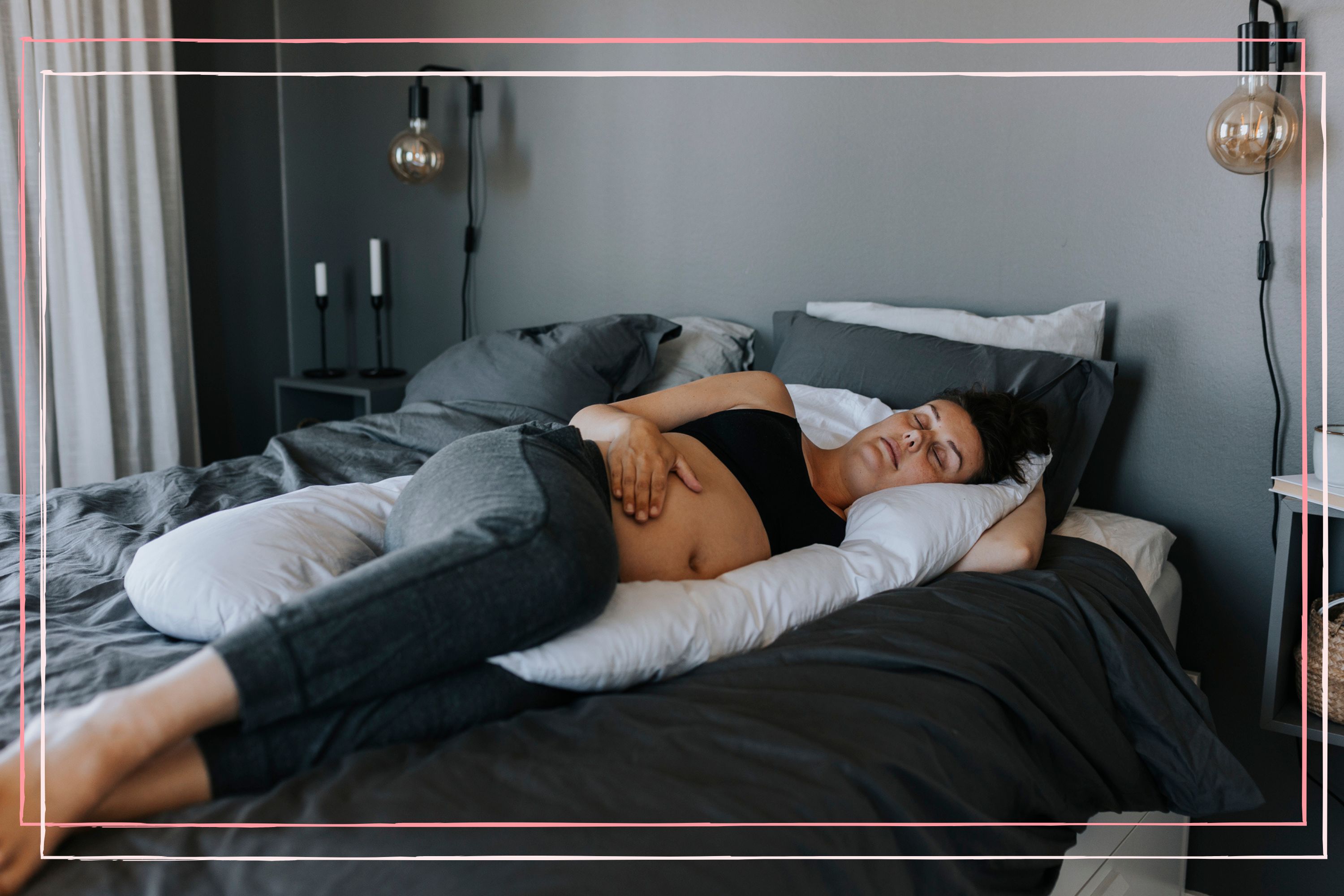The reasons behind your pregnancy snoring and advice from doctors on what to do about it
Two GPs share their advice on pregnancy snoring, including how to best manage it at home and when to go and see your doctor


Parenting advice, hot topics, best buys and family finance tips delivered straight to your inbox.
You are now subscribed
Your newsletter sign-up was successful
Pregnancy snoring is more common than you might think and usually resolves itself after you give birth.
Once you are pregnant there are a whole range of pregnancy symptoms you will discover, from waking up early and hot flashes, to lesser known and less common ones like tinnitus in pregnancy.
Pregnancy snoring is one of the lesser known side effects of being pregnant, and while it will not affect everyone, The Sleep Foundation estimates that as many as 50% of people snore regularly while they are pregnant.
"It is not uncommon for women to start snoring during pregnancy and may come as a shock for many who may have never snored before," GP Dr Semiya Aziz told us.
In addition to Dr Aziz, we also consulted Dr Aarthi Sinha, NHS and Private GP from Church Crescent Medical Practice, and the two GPs shared their advice with us about pregnancy snoring, including how to best manage it at home and when to go and see your doctor.
The information in this article is for general purposes only and does not take the place of medical advice. If you are unsure or concerned about any element of your pregnancy, then it is crucial to seek personalised advice from a doctor as soon as possible.
When does pregnancy snoring start?
While pregnancy snoring can start at any time, it becomes more likely as you get further along and is most likely to start towards the end of pregnancy in the third trimester.
Parenting advice, hot topics, best buys and family finance tips delivered straight to your inbox.
"Although snoring can start at any point during pregnancy, snoring becomes more noticeable in the second and third trimesters," explains Dr Aziz.
What causes pregnancy snoring?
Snoring in pregnancy can be caused by several factors such as weight gain, fluid retention, nasal congestion, hormonal changes and enlargement of the uterus.
"It can be common to start snoring in pregnancy due to nasal congestion from increased hormone levels causing fluid retention," explains Dr Sinha. "Increased weight gain can also contribute to this." She expands, "You retain more fluid overall in pregnancy due to increased oestrogen and progesterone levels. This causes congestion of your nasal passages and combined with weight gain can lead to snoring starting or getting worse in pregnancy."
Dr Aziz also explains that snoring can be triggered by the hormonal changes that you go through during pregnancy, "Hormonal changes contribute to a buildup of fluids in the nasal passages reducing the space needed to breath. These changes may also increase the risk of nasal congestion, which can further restrict breathing."
Dr Aziz adds, "during pregnancy the size of the uterus increases and this can put pressure on the airways and may lead to airway obstruction during sleep."
Will my snoring get worse during pregnancy?
Dr Sinha told us that yes, if you snored before getting pregnant it is likely that your snoring will get worse during pregnancy: "Snoring will likely worsen in pregnancy due to fluid retention caused by hormonal levels increasing. Significant weight gain (above what would be expected or healthy) may also exacerbate this, so it is important to have a healthy appropriate diet in pregnancy."
Will pregnancy snoring go away and when?
Both Dr Aziz and Dr Sinha say that pregnancy snoring will usually improve or resolve itself after you give birth, but you should speak to your GP if you are concerned or if the snoring continues after pregnancy.
"Snoring in pregnancy usually resolves after childbirth, once the hormonal levels normalise, as will the uterus return to a normal size and there is also reduced fluid retention," explains Dr Aziz. "In some cases however, snoring may persist after delivery, especially if there are other underlying factors such as obesity or sleep apnoea."
Dr Sinha emphasises the importance of getting personalised advice from your doctor, "Snoring will likely improve after pregnancy. However, if you have any pre-existing conditions that caused snoring before you were pregnant, then it may continue, and you may need to seek medical advice from your GP or a specialist. Common causes of this include a deviated nasal septum (where the bridge of your nose is bent or crooked slightly causing one side of your nose to be narrower than the other) or being overweight."
Managing and reducing pregnancy snoring
Whilst you can’t completely prevent snoring during pregnancy, there are things you can try to help reduce its severity. It is essential to consult your doctor about any concerns you have about pregnancy snoring before trying out any methods of managing the condition.
Dr Aziz and Dr Sinha suggested the following methods for helping to manage pregnancy snoring:
- Sleep on your side: Sleeping on your side instead of your back may be of some benefit.
- Maintain a healthy weight: Weight gain during pregnancy is normal, but one of the lifestyle measures you can try to reduce snoring in pregnancy is keeping weight gain to the expected healthy amount.
- Use a humidifier: Sleeping with a humidifier in the room can help keep the airways moist.
- Practise good sleep hygiene: Get a good night’s sleep by making sure your bedroom is quiet, dark, relaxing and at a comfortable temperature.
- Elevate your upper body with extra pillows: Avoid raising just your head.
- Try nasal strips: The use of nasal strips or nasal saline drops may help to alleviate nasal congestion but always check with your GP or health care professional first before trying anything.
If your snoring symptoms get worse, or you are concerned, then it is crucial to seek personalised advice from a doctor as soon as possible.
Is pregnancy snoring anything to worry about?
If you are concerned about snoring, or any other symptom of your pregnancy, you should always go and see your doctor and discuss your concerns with a healthcare professional.
"Pregnancy induced snoring, in general, is not a cause for concern and usually resolves after childbirth. If however, snoring is accompanied with other symptoms such as daytime fatigue, excessive daytime sleepiness, or gasping and choking during sleep, then this may indicate a more serious underlying sleep disorder," says Dr Aziz. "If this is the case, further medical assessment and management is warranted."
An underlying sleep disorder could be something like sleep apnoea and Dr Sinha emphasises the importance of knowing the difference between snoring and sleep apnoea and getting the right medical support and treatment: "There is a difference between simple snoring and sleep apnoea. Snoring is usually a heavy breathing, whistling or rattling noise when sleeping, caused by vibration of the airways. Sleep apnoea is a more serious condition, where your breathing can stop and start whilst you are asleep. You may have episodes of gasping or choking when asleep and generally your oxygen levels are low whilst you are asleep causing you to wake up feeling unrefreshed and tired. This needs referral to a sleep clinic by your GP for further support."
Signs of sleep apnoea include waking with a choking sensation or feeling chronically tired during the daytime, despite the fact that you thought you got sufficient sleep at night. If you suspect you may have sleep apnoea then it is very important to speak to a GP as soon as possible.
The information on GoodTo.com does not constitute medical or other health advice or diagnosis and should not be used as such. Although GoodtoKnow consults medical experts to create and fact-check content, this information is for general purposes only and does not take the place of medical advice. Always seek the guidance of a qualified health professional or seek urgent medical attention if needed.
Our experts

Dr Aarthi has been practising as a GP for almost 10 years. Most of that time was spent as a senior partner in practice. Dr Aarthi says "I completed my medical training at the Guy’s, King’s and St Thomas Hospital Trust – which is part of King’s College London. I then undertook further medical experience around the country before settling back into North London where I completed my GP training. Apart from my medical degree I also have a Bachelors degree in radiological sciences and several diplomas in gynaecology, sexual health and occupational medicine. I will therefore be able to support patients not just as their doctor but may be able to discuss how their health affects their work or their work affects their health."

Dr. Semiya Aziz is a seasoned general practitioner with over 20 years of experience as a GP in both the NHS and in private practice. She first obtained her degree in microbiology from Queen Mary University of London, and subsequently, she obtained her MBBS from The Royal London Hospital. She is a member of the Royal College of General Practitioners and the British Society of Lifestyle Medicine. She is also registered with the Care Quality Commission (CQC) and the General Medical Council (GMC).

An internationally published digital journalist and editor, Rachael has worked for both news and lifestyle websites in the UK and abroad. Rachael's published work covers a broad spectrum of topics and she has written about everything from the future of sustainable travel, to the impact of the coronavirus pandemic on the world we live in, to the psychology of colour.